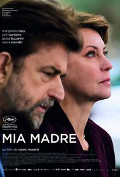
Directed by
Nanni Moretti
106 minutes
Rated M
Reviewed by
Sharon Hurst

Mia Madre
Synopsis: Margherita (Margherita Buy) is a film director trying to juggle her personal life with her professional life. She is currently directing a film about industrial unrest and to play the factory boss she has hired Barry Huggins (John Turturro), an egotistical American actor who speaks limited Italian. But too much personal drama is taking its toll - her adolescent daughter Livia is slacking off in her Latin studies, her affair with a colleague has ended, but worst of all her beloved mother Ada (Giulia Lazzarini) is dying. While Margherita’s brother Giovanni (Nanni Moretti) has more free time for tending to Ada, Margheritia is rushing from work to sick bed and unravelling along the way.
Nanni Moretti is an intensely personal film director who injects his compassion for and sensitivity to human foibles and emotions into his work. My favourite film of his, The Son’s Room (2001) looked at every parent’s fear, the death of a child. His latest tackles something most people will go through at some stage in life, the death of a parent. Interestingly, he opts not for a heart-wrenching drama, but something that walks between pathos and comedy. This unevenness of tone troubles me, as it prevented me from truly engaging with the sadness that Margherita and Giovanni feel. Scenes that attempt to be comic, such as driving a car with three cameras strapped to the windscreen, or doing an odd Egyptian style dance at a cast and crew party fall flat and undercut the more serious thrust of the narrative. Turturro, himself a fine actor, is playing a bad actor, and his Huggins didn’t ring totally true for me.
Much of the film is taken up with Margherita’s effort to make her film as she struggles with bad choice of extras by the casting people, an infuriating lead man who can’t seem to remember his lines, but most troubling, her increasing inability to focus on her job as her mother’s deterioration becomes more evident. The scenes of the film’s shooting are less compelling than the personal drama, and the fact that they take up so much time seems a little like a self-indulgent look at the directorial process at the expense of the more intimate story.
That said., the aspects of Mia Madre that deal with the various ways in which people approach death are superbly handled. Margherita is in denial. The deep bond between her and Ada is beautifully portrayed, more by expression and body language than actual dialogue. (The fact that both women won Donatello awards for their performances speaks volumes). Buy grasps what it means to be torn apart by the knowledge that you are about to lose someone so dear and the impact it has on one’s ability to function on a daily basis. The love that granddaughter Livia (Beatrice Mancini) feels for her Nonna is reflected in exquisitely simple scenes such as the teenager studying her Latin with her grandmother’s help. The unspoken bond between brother and sister works to perfection, as does Giovanni’s more pragmatic tackling of the situation.
All this works so well that I found it disappointing that so much of the film is devoted to the film within a film and misguided attempts to create humour. With such a powerful plot I wanted to feel much deeper emotion,but the disengagement created by the off-kilter tone prevented this, creating a chill that I should not have felt from this otherwise affecting narrative.

Want more about this film?


Want something different?




